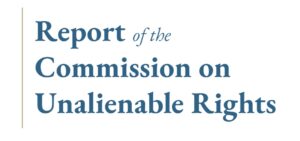 On July 16, the State Department released the Draft Report of the Commission on Unalienable Rights. The report, as Walter Russell Mead notes, is “a thoughtful and carefully reasoned document that may serve as an important landmark.” Given the Commission’s charge, though, it should be titled “A Comprehensive Review of U.S. Human Rights Policy,” as this blogger requests in the public comment process.
On July 16, the State Department released the Draft Report of the Commission on Unalienable Rights. The report, as Walter Russell Mead notes, is “a thoughtful and carefully reasoned document that may serve as an important landmark.” Given the Commission’s charge, though, it should be titled “A Comprehensive Review of U.S. Human Rights Policy,” as this blogger requests in the public comment process.
In current policy practice, human rights policy is one among many fields of foreign policy. In contrast, the Declaration of Independence identifies the American people as “we” who hold to unalienable rights and governments dedicated to secure them. A policy skein is properly configured according to political mandates, choices made by the people. The Declaration’s truths, its creed, defines the nation and should shape the foundations of all U.S. policy.
Arguably the creed has filled that role, for long stretches only subliminally and too often in the breach, but has always held at least a latent influence. The Report acknowledges the creed’s deep current. Its first section is titled “The Distinctive American Rights Tradition,” and notes “Lincoln’s Return to the Declaration.” But the section’s title also reveals the limits to the Commission’s remit, which was to examine human rights policy. Human rights as a policy thread can reasonably take grounding from the full sweep of Enlightenment thought. The nation’s identity rests on the creed as voiced in the Declaration.
So the Commission’s Report looks at the Declaration as “an essential element” of a human rights tradition, not as the nation’s base of identity. It discusses traditions that formed the Declaration’s concepts, citing property and religion as central to rights, where the Declaration’s creed names neither. True, John Locke’s Second Treatise of Government cited “property;” Jefferson named a right to the pursuit of happiness. And yes, Locke saw liberty as necessary for true faith, but the Declaration refers to a “Creator” as the otherwise unnamed font of rights.
This distinction between unalienable rights as a tenet of national existence and human rights as a policy arena matters, though in a manner that remains subtle in current American discourse. Americans agree that rights are fundamental – Secretary Pompeo, in announcing the report’s release, cited as the first question for U.S. policy: “Are our foreign policy decisions rooted in our founding principles?” But human rights in today’s policy constellation make up one skein of a very large bundle of priorities, alongside national security, economic well-being, and many others.
The choices, the priorities assigned to the various policy skeins, are made through politics. Often those choices show up when one, like national security, provides the lens through which the others are assessed. Thus Secretary Pompeo says “our dedication to unalienable rights doesn’t mean we have the capacity to tackle all human rights violations everywhere and at all times.” A different voice might say “our dedication to national security can never guarantee perfect safety against every danger, so we may have to forego the nth degree of protection against the nth threat for …” some other policy priority.
The Declaration’s unalienable rights are not a matter of just another policy arena. The purpose of security is to secure those rights; prosperity is an auxiliary to allow them free rein; “human rights” refer to political and social practices. The Declaration’s creed forms America’s fundamental priority; it requires an art to synthesize the needs of security, prosperity, human rights and other demands, in a manner that best serves the unalienable rights.
Current policy discourse is not structured with this core at its core. It should be. The Declaration’s creed is the last common ground that partisanship and polarization cannot dissect for rhetorical usage. With the creed’s role reinforced as that bedrock of common American identity, policy making would be more amenable to effective compromise and less paralyzed by politicized intransigence.
To restructure public discourse is clearly beyond any commission’s possible remit, but the distinction between human rights policy and the fundamental role of the Declaration is important. Choices among policy threads are political, and today’s divisive discourse should not obscure the common ground of the nation’s founding. The Commission on Unalienable Rights was formed to examine a specific distinction in human rights policy, “between unalienable rights and ad hoc rights granted by governments.” But a broader distinction must be understood and maintained, between that particular policy debate and the Declaration’s creed as America’s first point of definition. Titling the final report as “A Comprehensive Review of U.S. Human Rights Policy” would help mark that distinction.

The Draft Report, Released July 16